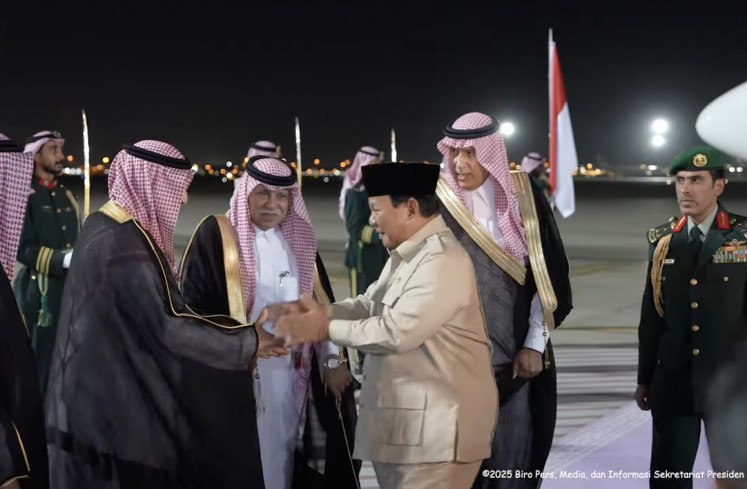Popular Reads
Top Results
Can't find what you're looking for?
View all search resultsPopular Reads
Top Results
Can't find what you're looking for?
View all search resultsFear haunts ethnic Chinese
Ask any Chinese Indonesian if they want to join a political party and chances are they will answer in the negative
Change text size
Gift Premium Articles
to Anyone

Ask any Chinese Indonesian if they want to join a political party and chances are they will answer in the negative.
"You have to know your place in society," is the usual answer, or "Politics is not our domain."
It is a standard answer, a legacy of the past New Order regime, which taught them to stay out of politics.
Those were the days when Chinese Indonesians grew their moustaches to narrow the gap of physical differences with their fellow Indonesians, converted to Islam in the hope to get equal treatment and donned sunglasses to hide their slanted eyes.
Others sun-bathed all day long to darken their fair skin or simply denied their identities. All were done with safety in mind as torturing Chinese Indonesians was something many prided in.
"Fear is inherent in every Chinese Indonesian," said Didi Kuartanada, a PhD candidate for history from the National University of Singapore, at a recent discussion.
Persecution of Chinese Indonesians dates back to 1740 during the Dutch colonial period, when thousands of them were murdered in Batavia.
People have a habit of viewing Chinese descendants in a political light, whether they are loyal or disloyal to the country, said Didi.
Indonesian people, including the elite, belive working with money is evil and shows an alliance with the devil. Hence, Chinese Indonesians are an obvious scapegoat.
Change came after the 1998 political reformation.
It is now possible for Indonesians of Chinese descent to set up organizations, although it has always been in the Constitution. It was only in 2000, Chinese Indonesian artists had the guts to openly admit their racial background. Under the Soeharto government, Mongolian faces rarely appeared on television.
A number of young Chinese Indonesians in Jakarta seek to fight racial discrimination and the age-old patron-client formula.
These young Chinese descendants launched their new book here on March 28, followed by a discussion.
Fear lurked behind the book's publication. Speaking at the launch, former student leader Suma Mihardja said some had turned down invitations to write for the book for fear of possible backlash.
Clumsily titled, if a bit derogatory, Pemikiran Tionghoa Muda: COKIN? sO wHat giTu Loh! (Thoughts of Young Tionghoa: Chinese, So What?), is a compilation of articles from media organizations post 1998 written by dozens of young Chinese Indonesian intellectuals.
In Jakarta Cokin is slang for Chinese Indonesians, "so what gitu loh" is a local variation of the English phrase "so what".
Edited by Ivan Wibowo, the book enlists writers such as Ester Indahyani Jusuf, Ponijan Liauw, Suma Miharja, Ulung Rusman, Christine Susanna Tjhin, Mohammad Gatot and Ignatius Haryanto.
The articles address issues about the military, corruption, ethnic conflict, Islam, soccer and political reformation..
During the discussion, the younger generation focused on issues different from those of their elders. Gone are the days when they debated the terms Cina or Tionghoa for Chinese Indonesians. The young Chinese Indonesians do not mind the term Cina, considered derogatory by their predecessors.
A palpable atmosphere of freedom was in the air.
Indra J. Piliang, another speaker, said Indonesia needed thinkers, not only in Jakarta, but all over the country.
People in smaller cities or regencies may not necessarily view things the same way as those in Jakarta, she said.
"You should go to the regencies because the future of the country lies there, not in Jakarta." said a researcher at the Center for Strategic and International Studies.
Jaringan Tionghoa Muda (Young Chinese Indonesians Network) is an organization set up by intellectuals in 2004.
Indra says an ethnic-based organization set up in Jakarta is long outdated pointing to the Yong Java or Yong Sumatra days before independence in 1945.
Didi reminds the audience Chinese Indonesians have never been united, except during the short period under Japanese occupation.
A participant asked why there have been no anti-Chinese riots after 1998. It was not an irrelevant question as anti-Chinese riots had been recurrent in Soeharto's years, although it was rarely reported in the media.
Unfortunately, the question went unanswered.
The author is a staff writer at The Jakarta Post.









